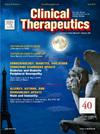Effect of Everolimus on Prognosis of Neurofibromatosis Type 1 Lesions: A Systematic Review and Meta Analysis
IF 3.2
4区 医学
Q2 PHARMACOLOGY & PHARMACY
引用次数: 0
Abstract
Purpose
This study addresses the effectiveness of oral everolimus in treating various malignancies associated with Neurofibromatosis Type 1 (NF1). The purpose is to determine whether everolimus reduces lesion size in NF1 patients, considering the controversial findings from previous clinical trials. The scientific hypotheses and questions involve evaluating the impact of everolimus on NF1-associated lesions and understanding the variability in treatment outcomes.
Methods
A systematic review and meta-analysis were conducted following PRISMA and Cochrane Collaboration guidelines. The study included four-phase II, single-arm, nonrandomized trials investigating the effect of oral everolimus on NF1-associated lesion size. The search covered multiple databases, and data extraction involved evaluating studies for inclusion criteria and assessing quality using the Cochrane Collaboration's Risk of Bias in Nonrandomized Studies tool. Statistical analysis utilized Open Meta(Analyst).
Findings
The search yielded 388 studies, with 10 selected for full-text review and four included in the final analysis. The quality of the studies ranged from low to moderate. The meta-analysis indicated no observed heterogeneity (I^2 = 0%), and the overall estimate suggested no significant reduction in NF1-associated lesion size with everolimus (P = 0.069).
Implications
The findings reveal a varied and inconsistent picture of everolimus efficacy in NF1 treatment. The study highlights the need for personalized approaches, considering individual genetic and clinical differences. The limitations, including small sample sizes and nonrandomized trials, call for larger, more standardized research efforts. The study emphasizes ongoing trials and the importance of future research in understanding predictors of everolimus response and optimizing treatment strategies for NF1 patients.
Conclusion
While everolimus shows promise in reducing lesion size in a subset of NF1 patients, the study cannot draw conclusive results due to limitations in the included studies. Ongoing, adequately powered trials are crucial for advancing the evidence base and informing the potential role of everolimus in NF1 treatment.
Others
There was no funding for this review and no conflicts of interest.
依维莫司对神经纤维瘤病 1 型病变预后的影响:系统综述与元分析
目的:本研究探讨口服依维莫司治疗与神经纤维瘤病 1 型(NF1)相关的各种恶性肿瘤的有效性。考虑到之前的临床试验结果存在争议,本研究旨在确定依维莫司是否能缩小 NF1 患者的病变范围。科学假设和问题涉及评估依维莫司对NF1相关病变的影响,以及了解治疗结果的可变性:按照 PRISMA 和 Cochrane 协作指南进行了系统综述和荟萃分析。研究纳入了四项II期、单臂、非随机试验,调查口服依维莫司对NF1相关病变大小的影响。检索涵盖多个数据库,数据提取包括评估研究是否符合纳入标准,以及使用 Cochrane 协作组织的非随机研究偏倚风险工具评估质量。统计分析采用 Open Meta(Analyst):研究结果:通过检索共获得了 388 项研究,其中 10 项被选中进行全文审阅,4 项被纳入最终分析。研究质量从低到中等不等。荟萃分析表明没有观察到异质性(I^2 = 0%),总体估计表明依维莫司不能显著减少NF1相关病灶的大小(P = 0.069):研究结果揭示了依维莫司治疗NF1疗效的多样性和不一致性。该研究强调了考虑个体遗传和临床差异的个性化方法的必要性。研究的局限性,包括样本量小和非随机试验,要求开展更大规模、更标准化的研究工作。研究强调了正在进行的试验以及未来研究在了解依维莫司反应预测因素和优化NF1患者治疗策略方面的重要性:尽管依维莫司有望缩小部分NF1患者的病灶大小,但由于所纳入研究的局限性,该研究无法得出结论性结果。正在进行的、有充分证据支持的试验对于推进证据基础和了解依维莫司在NF1治疗中的潜在作用至关重要:本综述没有资金支持,也没有利益冲突。
本文章由计算机程序翻译,如有差异,请以英文原文为准。
求助全文
约1分钟内获得全文
求助全文
来源期刊

Clinical therapeutics
医学-药学
CiteScore
6.00
自引率
3.10%
发文量
154
审稿时长
9 weeks
期刊介绍:
Clinical Therapeutics provides peer-reviewed, rapid publication of recent developments in drug and other therapies as well as in diagnostics, pharmacoeconomics, health policy, treatment outcomes, and innovations in drug and biologics research. In addition Clinical Therapeutics features updates on specific topics collated by expert Topic Editors. Clinical Therapeutics is read by a large international audience of scientists and clinicians in a variety of research, academic, and clinical practice settings. Articles are indexed by all major biomedical abstracting databases.
 求助内容:
求助内容: 应助结果提醒方式:
应助结果提醒方式:


